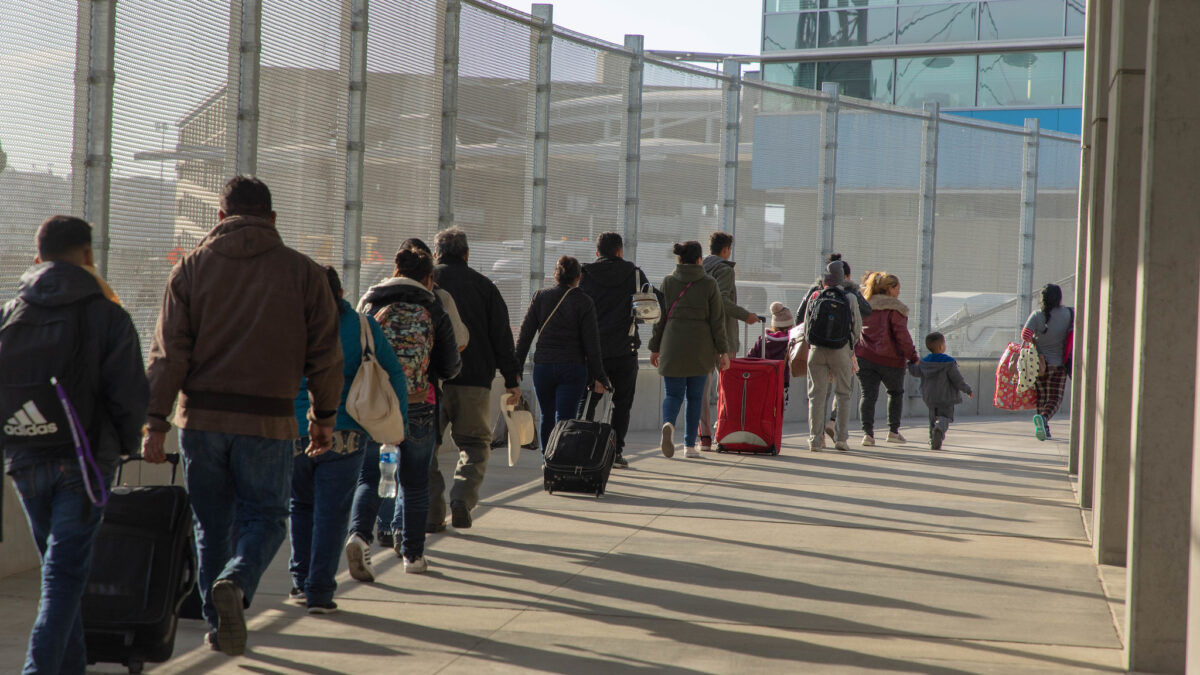
The candidacy of Donald Trump, built on a foundation of openly contemptuous anti-immigrant rhetoric, has invigorated the anti-immigration right. In addition to the cruder appeals—about foreigners “taking our jobs,” or outright appeals to racism (which Trump’s candidacy has brought out of the woodwork on social media)—there is a more subtle argument that has gained a disturbing amount of credence among people I otherwise consider allies on the right, including some libertarians and even Objectivists.
The argument is that curbing immigration is about preserving our culture, specifically our political culture, from being diluted by hordes of newcomers who were raised in an alien culture that doesn’t value liberty. The idea is that our native-born citizens’ fierce commitment to liberty is in danger of being overwhelmed by immigrants’ Third World culture, and we will get a corrupt, illiberal Third World government to match.
You may notice a couple of dubious premises right off the bat. There’s that one about the native-born citizens’ commitment to liberty, which is so fierce we have voted ourselves a vast network of regulatory agencies and $18 trillion of national debt. Then there’s the assumption that our government is not already corrupt and based on patronage and tribal appeals, a claim that seems optimistic in a year when Hillary Clinton and Donald Trump are the front-runners for our two big political parties. And just on the most superficial level, you can observe how much of our “native” culture, starting with our cuisine, has always been a melting pot of positive contributions from various immigrant groups.
But that’s just the beginning. This argument is wrong on pretty much every level.
First of all, on the principle that hard cases make bad law, I’m going to set off to one side cases like the crisis of Syrian refugees now pouring into Europe, which poses some very real problems, such as how to filter out radicalized Muslims and jihadists, or how to provide food, housing, and employment to people who have no way to provide for themselves. All of these raise good questions, and there are good reasons for Europe to think carefully about how to deal with the current crisis. But that is different from the question of what to do with steady long-term immigration, particularly the multi-decade trend of Latin American immigration to the United States.
The question is: is there a cultural and political threat posed to America by long-term openness to immigration from the “wrong” countries or cultures? Is there any merit to this argument?
First of all, the political assumptions here are overblown. You will often hear the claim that allowing “amnesty” for illegal immigrants will create tens of millions of new voters for the Democratic Party. Sean Trende at RealClearPolitics has run the numbers and concludes that this is vastly overestimated. If we provide a path to citizenship for illegal immigrants, not all of them will choose to devote the time and expense required to follow it. Of those who do, not all will vote, and of those who do vote, believe it or not, they don’t all vote in lockstep. He concludes that a new amnesty might eventually net Democrats a million votes nationwide but “would fail to flip any states in the Electoral College.” So much for the great Democratic Party conspiracy to use immigrants to seize a majority.
The United States is a large and stable nation and can absorb seemingly large numbers of people without much political impact. Moreover, the great wave of Latin American immigration—and these are the immigrants who are regarded with the greatest suspicion—has crested. Recent poll data on America’s Hispanic population, for example, shows that the native-born increasingly outnumber the foreign-born, an indication of diminishing immigration.
That leads us to the ugly underside of this political/cultural argument against immigration. In practice, it amounts to a complaint about the voting patterns, not of new or future immigrants, but of racial and ethnic groups who are native-born. It is an attack on our fellow Americans.
This “cultural” case against immigration is really a complaint about Hispanic citizens, who usually vote for Democrats by about two to one, and black citizens, who usually give more than 80% of their vote to Democrats. To those who make these arguments, let me point out: these are your fellow citizens, just as entitled as you are to claim this country as their home and its government as their servant. If you think they’re voting the wrong way, you can’t deport them. You have to convince them.
Instead, these complaints are a self-fulfilling prophecy. Rather than seeking to persuade and convert our fellow citizens, this is a perfect way to alienate them by dismissing them as irreconcilable enemies. More than anything else, this is what plays into the hands of the actual Democratic Party strategy, which is not about recruiting some fantasy bloc of new immigrants, but about keeping native-born black and Hispanic voters voting in lockstep. To do this, the left needs to maintain and increase America’s sense of racial and ethnic division—and those who portray “non-Europeans” as permanent political enemies are doing the Democrats’ work for them, way better than they could have done themselves.
The irony is that the Democrats’ grip on these voters is relatively recent and far from inevitable. Among black Americans, there is a long tradition of self-reliance, forged during many decades in which they had no reason to look to the government as their ally. Today’s “black conservatives” are products and reminders of that tradition. Meanwhile, Latin American immigrants are famously hard-working and entrepreneurial. Let’s just say that the parents of Ted Cruz and Marco Rubio are not exceptional cases. George W. Bush managed to win 44% of the Hispanic vote in 2004, so there is no inevitability to their political allegiance, as the crude cultural determinists seem to think.
These voters are reachable, and that is precisely what the Republican Party was trying to do before Donald Trump came along. That’s why I suspect the actual effect of his candidacy will be to increase the likelihood of Marco Rubio ending up on the ticket. Trump’s anti-Hispanic rhetoric will have caused so much damage that mainstream Republicans will be eager to compensate with a fluent Spanish-speaker who can talk eloquently about the immigrant’s experience in pursuing the American Dream.
And that brings us to the ugliest part about the claim that immigrants are the ones dragging America away from the ideal of liberty. Corruption and patronage in politics are not “Third World” imports. They have been part of American politics since the beginning and were arguably much worse in the 19th century, under the spoils system, before civil service reforms. That was under the presidency of Andrew Jackson, who would be considered a small-government radical by today’s standards. (But then again, he was a Democrat.)
The hard truth is that big government is a creation of native-born Americans. The “Progressive” ideology had its roots in America in the late 19th century and was advanced by true-blue, native-born Americans with names like Wilson and Roosevelt. Some of them were even Republicans. And today, who provides the backbone of support for the farthest left candidate on the Democratic side, self-declared socialist Bernie Sanders? White people. As for the wider notion that people born into a European culture are somehow so much better prepared to accept and defend liberty, I’ll just point out the the world’s worst totalitarian systems were developed and implemented within the last century by some of the whitest people in the world, in the heart of Europe.
But for some of the people making this argument, it’s not really about liberty or small government. While I’ve been hearing the argument a bit from libertarian types, you mostly hear it from people who would never dream of letting politicians touch Social Security or Medicare. Their standard-bearer, Donald Trump, has criticized any attempt to reform, reduce, or privatize the big entitlements that actually dominate the federal budget. So their objection to other groups corrupting our political culture really just means: we wanted the entitlement state for people like us, not for those other people who we don’t like. Well, I’ll give them one thing: somebody‘s corrupting the political culture.
Ignoring our own role as the authors of big government and attributing it all to some foreign source that can be repelled if we just build a wall is an act of denial. The regulatory and welfare state is here because the American people wanted it, and if we decide we don’t want it, it could be gone tomorrow.
Yes, culture matters, and so do the American ideals of liberty and individualism. But this “cultural” anti-immigrant argument makes us complacent about the work required to maintain and re-assert those ideals in our own minds—while also making us forget their universal meaning and power, and their ability to inspire everyone no matter where they came here from. It underrates and disparages the power of ideas, and seriously overrates the power of walls and guns and controls.
Those who whip up fear of a cultural takeover by immigrants encourage us to forget the work of defending our ideals, and to give up on the power of ideas altogether. That is very bad news for the political culture they say they want to preserve.
Follow Robert on Twitter.









